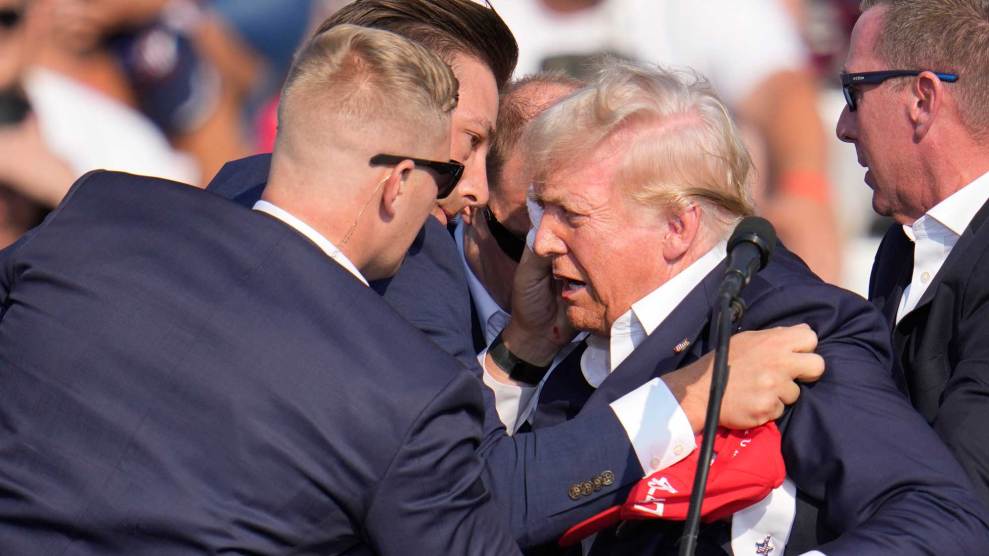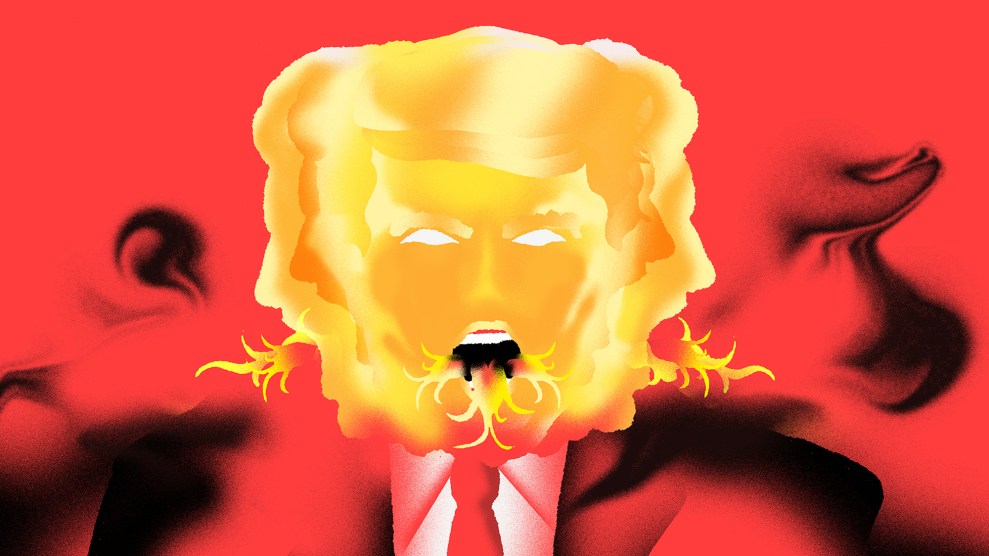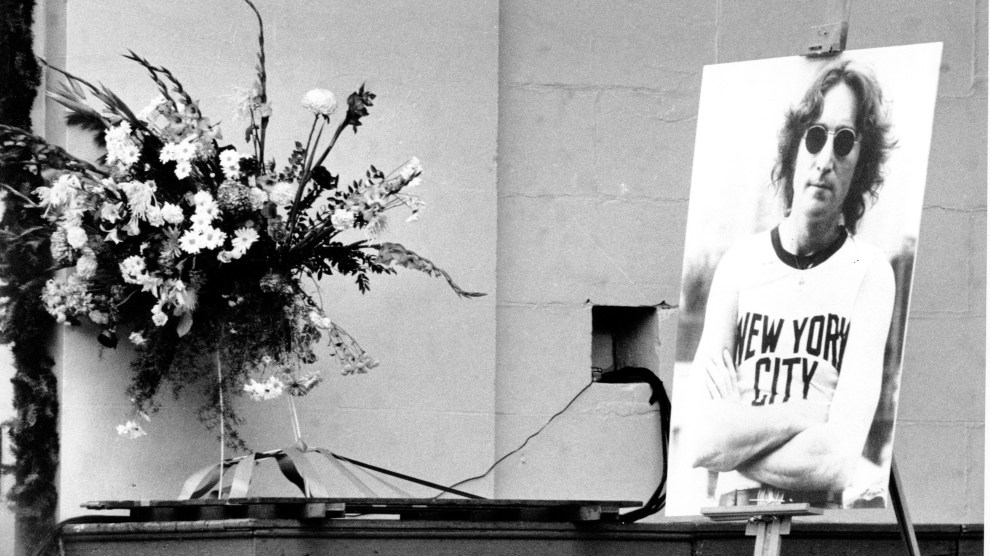
Mother Jones illustration; Courtesy Photo/The Washington Post/Getty
Five days after the horrific attempt on Donald Trump’s life at a campaign rally in Butler, Pennsylvania, we have a clear picture fundamentally of what happened. There was a catastrophic failure by the Secret Service to protect the former president from a gunman who, incredibly, was able to occupy a rooftop about 450 feet away and get a clear shot at Trump onstage. Trump was wounded on his ear, a 50-year-old man in the crowd hit by the gunfire died shielding his family, and two other people were critically injured. The gunman was quickly shot to death by a Secret Service sniper.
But a crucial piece of this tectonic event remains missing: We still know virtually nothing about the motive of the perpetrator, 20-year-old Thomas Matthew Crooks, a recent community college student from suburban Pittsburgh. That information void, unusual after a high-profile attack, may have its own repercussions after being filled by a maelstrom of partisan exploitation and conspiracy theories.
In the immediate aftermath on Saturday—well before the shooter’s identity even began to emerge—Rep. Mike Collins of Georgia claimed that “Joe Biden sent the orders” and should be charged with “inciting an assassination.” His fellow Republican and Trump backer, Rep. Marjorie Taylor Greene, said that “Democrats wanted this to happen” and further declared with no evidence that “they tried to murder President Trump.” Swift partisan blame also came from Trump’s son Eric and a prominent Trump adviser, Chris LaCivita, who said, “they tried to put him in jail and now you see this.”
Anger and threats from partisans with large social media followings flooded X.com and other platforms. “Retribution is coming,” inveighed one prominent MAGA account. “Guarantee you that.” The post drew more than 100,000 views and included the instantly iconic news photo of Trump pumping his fist as he was evacuated from the stage, his face streaked with blood.
“Extremist groups will take advantage of anything that fits into their narrative and this is a really big plot point for them.”
As various MAGA supporters claimed that Biden had ordered a hit on his election opponent, some on the left spread outlandish conspiracy theories about the attack being “staged” by Trump. An adviser to major Democratic donor Reid Hoffman suggested in an email to journalists they should consider whether the shooting had been encouraged or perhaps even arranged so that “Trump could get the photos and benefit from the backlash.”
Ahead of this week’s Republican National Convention in Milwaukee, some party leaders called for calm and a message of unity—but many, including Trump’s now-running mate, JD Vance, continued to declare that Biden’s campaign rhetoric was the direct cause of the assassination attempt.
This atmosphere is further heightening concerns about violence, according to threat assessment leaders with expertise in counterterrorism and mass shootings who I spoke with. Risk of a cycle of political violence and recrimination, including from the far left, is a growing worry. But their greatest concern remains potential bloodshed stemming from Trump’s long-running campaign of incitement and his message that he is supposedly the victim of a systemic conspiracy—a narrative that has now been supercharged.
“Trump people were already mobilizing around the phony message of ‘we’re going to get screwed again by a rigged election,’” one threat expert told me, “and now they’re piling on the idea that the opposition is so out to get Trump that they even tried to kill him, and therefore retaliation is justified. Only a small number of people might take violent action on this, but you don’t need much for things to get worse.”
“Extremist groups will take advantage of anything that fits into their narrative and this is a really big plot point for them,” said another threat assessment expert. (These sources asked not to be identified due to the sensitivity of the Trump shooting investigation and their working relationships with federal law enforcement agencies.) An intelligence bulletin from the FBI and DHS sent earlier this week to law enforcement throughout the country warned of potential “follow-on or retaliatory attacks.”
Early investigation suggests that Crooks, from the Pittsburgh suburb of Bethel Park, left behind few if any real clues as to why he targeted Trump. The relatively thin portrait of him is decidedly mixed in terms of any possible political identity or motive. He was registered to vote as a Republican, and neighbors have told reporters they recalled seeing Trump MAGA signs in the yard of the house where Crooks lived with his parents. Crooks also once donated $15 online to a liberal fundraising group. CNN reported that state voter records show his mother is registered as a Democrat and his father as a Libertarian. His father owns more than a dozen guns and a decade ago purchased the AR-15 used in the attack, according to law enforcement officials.
Media interviews with former high school classmates and employees at a skilled nursing home, where Crooks worked as a dietary aide until last week, all suggest he was quiet, kind, and intelligent. He graduated Bethel Park High School in 2022, where he won a math award, and in May he completed an associate’s degree in engineering science from the Community College of Allegheny County. Claims in the media by a couple of former peers that Crooks was bullied in high school have since been strongly contradicted by a school guidance counselor who worked with him and said he knew him well; the counselor told the Washington Post that Crooks never was bullied, had no disciplinary record, and had a group of close friends. (The idea that bullying is a root cause of school and mass shootings goes back to Columbine and is misguided in many cases.)
None of the wave of media coverage has included reports of Crooks expressing strong political or ideological views, let alone personal grievances or threats. He appears to have had scant presence on social media, relatively unusual for a person of his generation. It’s unclear whether his trail will lead to any meaningful “legacy tokens,” as FBI experts call the written screeds, images, videos, or other evidence that many perpetrators leave behind to convey their grievances and influence media coverage.
By Monday, FBI investigators had begun examining data from a cellphone belonging to Crooks, but they have found “nothing significant” so far to help explain his mindset or intent, a law enforcement official familiar with the investigation confirmed to me. There is no indication to date that anyone else was involved, officials have said. Investigators have spoken with Crooks’ parents, who seemed to have little insight into their son’s motive, according to reporting in the Wall Street Journal. A second cellphone and other devices Crooks used could yield further information. FBI Director Christopher Wray said on Wednesday afternoon in a Senate briefing that no motive had been established after extensive investigation. FBI analysis of Crooks’ online activity found that he searched for images of Biden and Trump as well as for dates and places for appearances by both of them.
Claims by former peers that Crooks was bullied in high school have since been strongly contradicted by a school guidance counselor who worked with him.
Threat assessment experts told me that a few things can reasonably be surmised at this point about Crooks. Given the physical circumstances of his attack from the rooftop, he likely had no expectation of escaping the Trump rally site and likely was suicidal, as many mass shooters are. It’s highly probable that further evidence exists of him planning and preparing for the attack—including and going beyond his visit to a gun range and his purchase of ammunition in the days ahead, as has been reported, and his advance surveillance of the attack site, which Wray reportedly discussed in Wednesday’s Senate briefing.
The FBI has said that Crooks had no record of mental health problems, but that doesn’t mean he had no such issues, or that he gave off no warning signs. (Nor would any mental health issues have predicted or fundamentally explained his attack—that’s a myth.) As I examined in my recent deep investigation into the 22-year-old who committed mass murder a decade ago in Isla Vista, California, perpetrators who are intelligent and able to present themselves as normal can be skilled at concealing their inner turmoil and lethal intent—while still also “leaking” signs of their plans far in advance.
Big gaps remain in what is publicly known about Crooks’ pathway to the attack: His home life and his relationships with his parents, with whom he lived in Bethel Park, remain of interest to investigators. Little has yet been reported about his recent time at community college.
Many assassination attempts in modern US history have not been motivated fundamentally by political ideology. One case from the 1960s resonates uncannily with the circumstances of today.
Another threat expert I spoke with suggested that America’s heated political atmosphere may have played a role more generally in the shooter’s choice of target. That is, the Trump rally coming to town may even have been a kind of ultimate crime of opportunity for a disturbed young man who wanted to go out in a blaze of infamy. Many shooters seek attention and notoriety—and after Trump announced the event in Butler 10 days ahead, what nearby target could’ve possibly offered that more?
In fact, seminal research in the field of behavioral threat assessment conducted in the early 1990s found that many assassination attempts in modern US history were not motivated fundamentally by political ideology. One case in particular from the 1960s resonates uncannily with the circumstances of today. After the Trump shooting, the Biden administration announced it would begin Secret Service protection for independent candidate Robert F. Kennedy, Jr., whose father was slain by an assassin’s bullet as he campaigned for president in summer 1968. The killer, Sirhan Sirhan, had expressed anger about Sen. Bobby Kennedy’s policy on arming Israel. But as I reported in my book Trigger Points, the pioneering threat assessment experts who personally interviewed Sirhan and studied his case as part of their research on assassins concluded that he ultimately was driven by a stew of behavioral disorders, personal failures, and fame seeking—not by any clear political motive. (The same was true of Ronald Reagan’s would-be assassin.) Notably, Sirhan had considered trying to kill several different public figures, and his stated grievances shifted over his years in prison, later even co-opting conspiracy theories about his attack.
Sirhan’s case was rife with evidence of his thinking and behaviors. A few targeted attacks in the decades since have been mostly bereft of such evidence, including the one by the suicidal gunman who massacred concertgoers in 2017 on the Las Vegas Strip, where he used AR-15s outfitted with bump stocks to kill 58 people and injure more than 500 others. That case is still widely considered to lack a clear motive.
Any student of history knows that the already rampant conspiracy theories about the Trump shooting will never go away. A big future revelation about motive in the case might dampen those, but the relatively minimal picture of Crooks so far suggests the possibility that we may never really have a clear explanation for why he did it. Yet, perhaps no case in modern memory reflects a greater urgency for additional facts to surface and prevail.
Thankfully, some people close to or directly hit by the tragedy have expressed sentiments of civility. Some Trump-supporting locals told reporters they rejected the partisan blame, including a disturbing message posted on a billboard in Butler afterward: “DEMOCRATS ATTEMPTED ASSASSINATION.” And although the widow of Corey Comperatore, the man killed at the Trump rally, refused to take a call from Joe Biden, she told the New York Post that she has no ill will towards the president: “He didn’t do anything bad to my husband. A 20-year-old despicable kid did.”

















